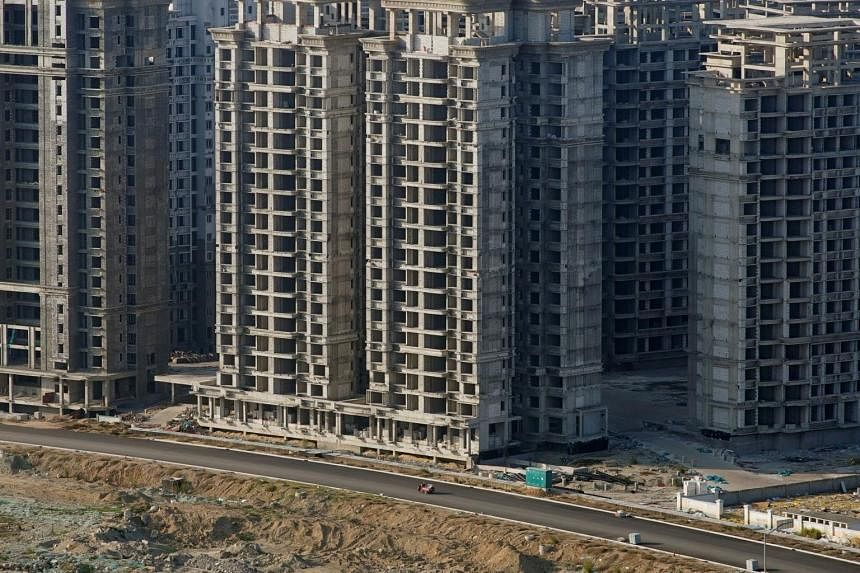BEIJING (BLOOMBERG) - China’s worst Covid-19 outbreak in two years is prolonging the country’s property slump, starving stressed developers of cash and weighing on the economy.
Only weeks ago, things were looking up for the battered real estate sector after the government pledged to prevent a disorderly collapse. Now, the industry is contending with lockdowns in key cities including Shanghai that are keeping prospective home buyers away.
China’s property sector contracted for a third straight quarter, official figures showed on Tuesday (April 19). A 29 per cent drop in new home sales in March was the biggest since they began falling last July. Seven months of falling home prices are adding to the pain.
“With the Covid-19 outbreaks, it is hard to call the market bottom,” said UOB Kay Hian analyst Ziv Ang, who had previously expected home sales to trough around May.
That is a fresh setback for debt-laden developers, which have been hoping for a rebound in sales to help them withstand their liquidity crisis as financing dries up and more bonds come due. It also adds pressure on policymakers to shore up an economy that is facing weakening consumer spending and the highest unemployment rate since the early months of the pandemic.
Lockdowns are hitting some of China’s strongest economic belts, from the manufacturing heartland in the Yangtze River Delta area in the east to trading centres in the Pearl River Delta in the south. In Shanghai, the biggest housing market among tier-one cites, a dozen new home projects due to go on sale were postponed because of the pandemic, according to research last week by property consultant Tospur.
“One major loser amid lockdowns is the property sector, which is now in the darkest moment with lots of defaults and consolidations,” said Mr Larry Hu, head of China economics at Macquarie Group. “At the national level, more policy support is needed for the sector to turn around.”
Already one builder, Zhenro Properties Group, has blamed the virus wave for missing bond payments this month, adding it to a growing list of defaulters.
Real estate firms have been trying to woo customers online, with mixed success. While some have convinced home buyers to view apartments with virtual reality technology since March under partial Covid-19 restrictions, full lockdowns in April eventually threw housing activities into a standstill, according to analyst Lu Wenxi at property agency Centaline Group.
Mr You Zheng, a 26-year-old real estate agent who had been handing out leaflets to passers-by with his mask on for months, said: “I am now worried about being fired.”
He added: “It was difficult enough last month when prospective buyers were afraid of being locked in a compound during apartment viewing. Now who knows when sales can resume.”
This time, the potential blow is likely to be worse than it was during the first outbreak more than two years ago in Wuhan. Property sales in the inland city account for just 0.8 per cent of the nationwide total, while the recently grounded Shanghai and Shenzhen make up a combined 6.5 per cent.
What is more, home buyer sentiment is much more fragile now than it was in early 2020, before the government’s crackdown on excessive leverage triggered the cash squeeze and disrupted construction. Back then, pent-up demand led to a quick recovery.
Chinese developers will face their biggest bond maturity wall in years in July, according to Bloomberg calculations. Refinancing is still constrained for the majority of private players, with average yields on offshore junk-rated debt dominated by builders above 20 per cent.
A Bloomberg Intelligence gauge of Chinese developer shares fell as much as 3.7 per cent on Tuesday morning, paring its gain from a March 15 low to 36 per cent. Chinese junk dollar bonds dropped one to two cents on the dollar, according to credit traders.
Among a batch of support measures following the Covid-19 outbreaks, the central bank late on Monday called for “reasonable” down payment thresholds for residential mortgages based on each city’s situation. Banks in several Chinese cities have cut deposit requirements for some home buyers since February.
Still, recent easing announced by various cities does not amount to a reversal of China’s overall real estate industry policy, and default risks in certain major developers still exist, the official Xinhua news agency reported on Tuesday.
“Sentiment may improve only with a turnaround in distressed developers’ liquidity, which is unlikely in the near term without stronger policy support,” Bloomberg Intelligence analyst Kristy Hung wrote in a note this week. “Covid-19’s spread adds additional near-term threats.”

